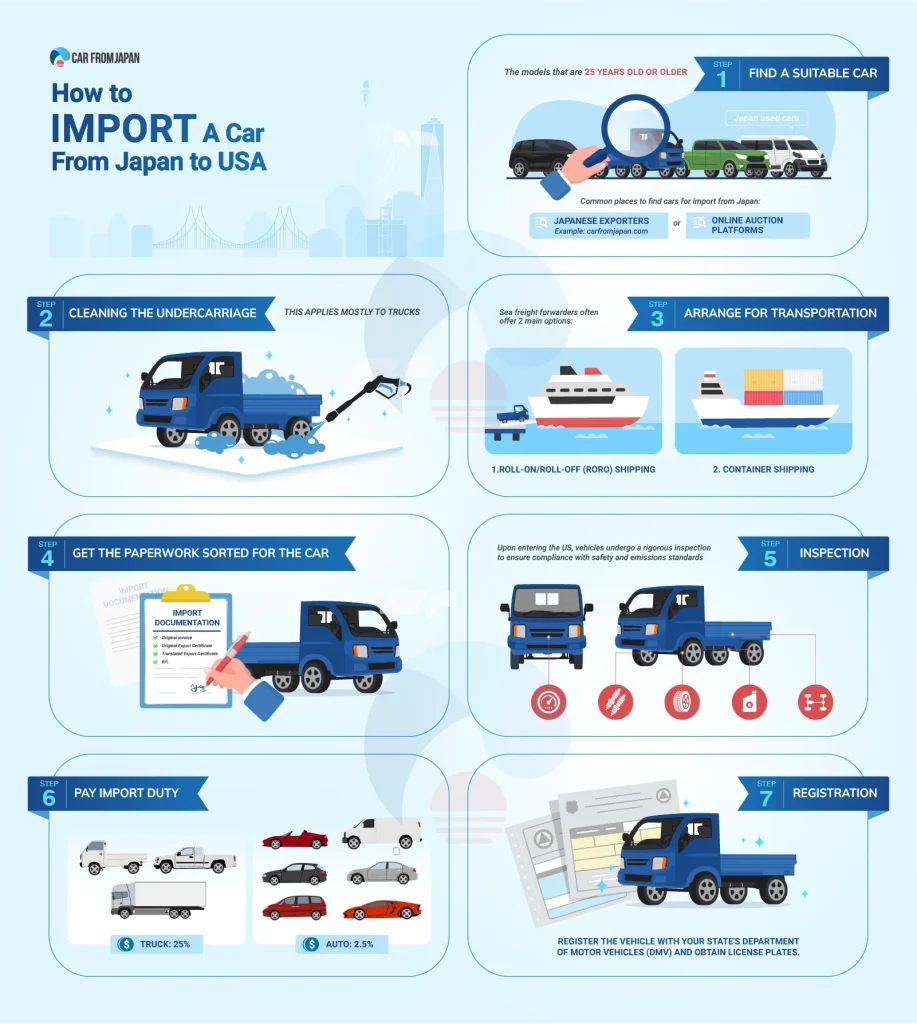The Japanese cars have long been known in America for competitively priced, well-engineered, technologically advanced, reliable cars.
According to the data from the Statista website, in 2023, Japanese car imports to the United States were approximately 1.49 million vehicles, increasing by 18% compared to the previous year, making Japan its pinnacle car exporter to the US.
It’s very exciting to drive a Japanese car on US roads. However, importing a car from Japan to the US is not a simple process; it requires lots of steps and effort. So, how do you import a car from Japan to the USA?
Follow us to see what the process of buying, shipping, and registering a JDM car in the US is actually like.
Contents
Can I Import and Register a Car from Japan to USA?
Yes, you can import and register a car from Japan to American shores and get it fully legal for use on public roads but there is a catch.
There are some strict rules involving importing a Japanese car in this country and you should be aware of them before starting the process.
- Used vehicles must follow the US 25-year car import rule. The rule states that a vehicle can only be imported to the US when it is at least 25 years old from its date of manufacture to be exempt from DOT and EPA requirements. Additionally, state-specific regulations may apply, so it’s recommended to check with local authorities for any additional requirements.
- Newer vehicles (less than 25 years old) must comply with all applicable Federal Motor Vehicle Safety Standards (FMVSS) to be imported permanently into the United States.
- Vehicles manufactured after September 1, 1978, must also meet the bumper standard, and vehicles beginning with the model year 1987 must meet the theft-prevention standard.
Know these basic rules before deciding to import a car to the US. If you violate this law, your beloved vehicle might end up in the scrapyard!

Pros and Cons of Importing Cars from USA
You might ask why anyone would want to import a car to the US – shipping it halfway across the world – when so many makes and models are available here.
There are some pros and cons of importing cars from Japan to USA that you should consider before making any decision:
Pros
Cheaper prices
This is one of the top reasons why many Americans are turning to import cars from Japan. For some models, importing from Japan will be less expensive than buying directly from the US, which means that you can get more for your money.
Depreciation and fluctuations in currency exchange rates can sometimes make importing from Japan more favorable.
High quality and reliability
Japan has built a global reputation for producing reliable and powerful vehicles. Japanese vehicles are renowned for their exceptional engineering, boasting powerful and reliable engines.
Beyond performance, they often feature sleek designs and meticulously crafted interiors that surpass many foreign and domestic competitors in terms of aesthetics.
This commitment to quality and style is a major reason why car enthusiasts choose to import vehicles directly from Japan.
Wide variety
The Japanese car market offers a wide range of vehicles, including many models that are not officially available in the US such as Nissan Silvia, Honda kei trucks, or Mazda Autozam AZ-1…By importing a Japanese car, you gain access to a wider variety of models and trim levels, offered at attractive prices.
Cons
Complex procedures and regulations
Importing cars from Japan to the US involves navigating complex procedures and complying with US regulations, causing unexpected costs or legal issues. Some car features or modifications may be legal or acceptable in Japan but may be illegal in the States.
It is advisable to research the laws in your state before deciding to import a Japanese car to your country. To have a smooth process, you must understand all import procedures, ensuring a hassle-free experience.
Inadequate understanding of vehicle condition
A common disadvantage for American buyers is not having a chance to check the vehicle’s condition directly.
Despite detailed condition reports from sellers, problems sometimes happen, such as not receiving the car you want or the car is damaged beyond repair… Choose a trusted exporter/seller to buy your dream car.
Transportation issues
Shipping cars from Japan to the US involves various logistical and transportation challenges, including cost and time estimations and potential vehicle damage during transit. Properly managing these factors is key to a successful import.
Read more: How To Import A Car From Japan To Canada
How To Import A Car From Japan To USA?
Importing a car from Japan to the USA can be very tempting, but potential risks could lead to significant losses if you’re inexperienced. How to import vehicles from Japan to the US? Follow the steps below to bring your dream car to your country:
Step 1: Find a suitable car
Decide whether you’re interested in a Kei car, a Kei truck, or another Japanese car model… Research the specifications, features, and prices to choose the model you like the most.
However, when choosing Japanese used cars, American buyers should abide by more stringent guidelines regarding the car’s age. Let’s pick the models that are 25 years old or older to legally import your car to the US.
Where to get the car? Here are some common places to find cars for import from Japan:

Japanese exporters
They are companies specializing in exporting Japanese cars to other countries. They handle the entire process, from sourcing the vehicle to shipping and documentation until your car arrives in the American port.
Some popular Japanese car exporters you can consider such as Car From Japan, Royal Trading, Be Forward, or SBT Japan while Car From Japan is a trusted name you can choose from.
With years of experience in selling and exporting vehicles across many countries in the world, including the USA, Car From Japan is a top online platform for importing Japanese used cars from Japan with a wide range of high-quality vehicles from classic sports cars to kei trucks at affordable prices.
Online auction platforms
Japanese auction platforms offer a massive inventory of vehicles at competitive prices. However, auctions can be fast-paced and competitive, requiring quick decision-making and potentially leading to overbidding.
One of the keys to making a successful importing process is thorough research and choosing the right provider. Remember to compare different sources before making a decision.
Step 2: Cleaning the undercarriage
This applies mostly to trucks, to safeguard against the importation of dangerous pests, the U.S. Department of Agriculture requires that the undercarriage of imported cars be free of foreign soil. Have your car cleaned thoroughly before shipment.
Step 3: Arrange for transportation
With your JDM car bought, it’s time to think about shipping. There are a few different ways you can ship your Japanese car to the US.
Sea freight forwarders often offer two main options: Roll-on/Roll-off (RORO) and Container Shipping, each with unique benefits and drawbacks.
- RORO shipping: Popular choice for standard vehicles and it’s generally more budget-friendly.
- Container shipping: This method offers greater protection, it’s an ideal choice for high-value or delicate vehicles.
Look for a company with a solid reputation and experience in international car shipping. A reliable export company will not only handle the logistics but also assist with the required paperwork, making the process smoother for you.
You should choose a company that offers tracking services so you can know the arrival date to make arrangements to process it through Customs and Border Protection (CBP).
Shipments typically clear at the first port of entry, unless you arrange for in-bond transport to a more convenient port. You’ll need to hire a customs broker for CBP entry, as officers cannot act as agents.
Step 4: Get the paperwork sorted for the car
You’ll need certain documents to make sure your Japanese import clears customs in the US.
Standard import documentation
- Original invoice: The invoice serves as legal proof that you purchased the vehicle from a specific seller in Japan. This is essential for import duties and taxes.
- Original Export Certificate: An Export Certificate is a document that certifies the product is being legally exported from its country of origin. This also means it has been de-registered from its previous owner in Japan.
- Translated Export Certificate: The English version of the Original Export Certificate is for your local use.
- Original Bill of Lading or surrendered Bill of Lading (B/L): A Bill of Lading (BL) is a document issued by the shipping company, which certifies that the product has been shipped out and mentions the product description & recipient.
Where do you get all these documents? Don’t worry! The exporter has a responsibility to provide you with all these necessary documents.
Other forms
Importing cars from Japan to the US adds another layer of difficulty with a couple of additional forms that need to be completed and provided to Customs and Border Protection (CBP):
- ISF form (Import Security Filing): It is also known as 10+2 required to be submitted to CBP no later than 24 hours before the cargo is loaded on the vessel destined for the US.
- EPA Form 3520-1: This document from the EPA confirms that the vehicle adheres to US emission control requirements.
- NHTSA Form HS-7: Importers must submit NHTSA Form HS-7 to demonstrate compliance with FMVSS regulations.
- CBP Form 7501 (Entry summary): To determine relevant information (e.g., appraisement, classification, origin, etc.) regarding the imported commodity
Step 5: Inspection
Upon entering the US, vehicles undergo a rigorous inspection to verify compliance with safety and emissions standards outlined in import documents.
Importantly, this inspection also includes checking the vehicle, particularly the tires and undercarriage, for dirt and debris.
Step 6: Pay import duty
Pay applicable import duties based on the vehicle’s value (not including the shipping fees). Japanese vehicles imported into the U.S., whether new or used, either for personal use or for sale, are generally dutiable at the following rates:
- Auto: 2.5%
- Trucks: 25%
For example:
Car price: $5,000
-> Import duty: $5,000 x 2.5% = $125 (Auto)
Step 7: Registration
To legally drive your imported car, register it with your state’s Department of Motor Vehicles (DMV) and obtain license plates. Contact your local DMV for required documentation, which may include paperwork from Customs and Border Protection (CBP). You might also consider getting an International Registration Marker.
Be sure to check your local / state registration office for your state registration and title requirements, and after that, you get to drive away in your “new” used vehicle.
Importing a car from Japan to the US will require thorough research and planning. Following these steps can help you successfully bring your dream Japanese car to the US.

How Much Does It Cost to Import a Car from Japan to USA?
What are the extra costs of importing a car from Japan to the US you might expect to pay besides the car purchase price:
Shipping fee: $1,500-$3,000
The primary cost of the whole process is the shipping fee, which mainly depends on the shipping method (RORO or Container shipping), the size of the vehicle, and the US port you choose to ship your car to.
Generally, the shipping cost will range from $1,500 to $3,000 depending on which shipping method you choose.
Import duties
Duty rates are based on the price paid or payable (not including the shipping fee). The rate will be 2.5% for automobiles and 25% for trucks.
ISF fee: $65
This fee is a required security measure established recently and must be filed no less than 72 hours before departure from the last foreign port before arriving in the USA. Normally, it will cost you $65.
The ISF Bond fee: $50 – $500
This fee is a charge applied when importing goods into the United States. U.S. Customs and Border Protection (CBP) requires this type of bond to ensure compliance with security and reporting requirements.
This fee varies between Surety/Insurance Agencies, Customs Brokers, and Freight Forwarders, ISF bond fees are typically between $50 and $500.
DOT reporting fee: $35
The DOT (Department of Transportation) reporting fee is a fee paid to the US government when importing a vehicle into the United States. The cost will be around $35.
EPA reporting: $35
The EPA reporting fee helps cover the costs of reviewing imported vehicles to ensure they meet US emissions standards.
Customs Entry Bond
A financial guarantee assures US Customs and Border Protection (CBP) that you’ll comply with import regulations and pay all applicable duties and taxes.
The formula calculated it: 3 times the price of the vehicle plus duty/taxes/fees divided by $1,000, rounded up to the next thousand; minimum $55.00
Harbor maintenance fee
The fee is assessed based on the value of the shipment. If the loading and unloading occur at a port, they must pay 0.125% of the value of the commercial cargo shipped. HMF is not collected on cargo imported or transported via air.
For example: Car price: $5,000
-> HMF: $5,000 x 0.125% = $6.25
The Merchandise Processing fee (MPF)
The Merchandise Processing Fee (MPF) for formal entries is an ad valorem fee of 0.3464 percent. The minimum fee shall not be less than $31.67 and shall not exceed $614.35. The fee is determined by the value of the imported goods, which does not include duty, freight, or insurance charges.
These are ballpark estimates about the costs you will need to pay to import a vehicle to the US. Please note that these fees can vary according to each state.
How Long Does It Take to Import a Car from Japan to USA?
Importing a car from Japan typically takes around 3 months or more from the time of payment.
While shipping usually takes 8-10 weeks, several factors can influence the timeline: Shipping method (RoRo shipping is generally faster than container shipping), vessel availability, and weather conditions…
For example, once your car is loaded onto a ship, it typically takes approximately 2.5 weeks to reach the West Coast of the USA.
Shipments to the Gulf of Mexico can take 4-6 weeks, depending on the specific route (e.g., Kingston or Mobile). East Coast ports generally have the longest transit times, potentially up to 8 weeks.

FAQs
Is it legal to drive a Japanese car in the US?
Yes, you can as long as your vehicle meets US safety and emissions standards. Generally, vehicles must be at least 25 years old to be exempt from these regulations. You’ll need to provide documentation proving the vehicle’s age and compliance with EPA and DOT regulations.
What is the tax on imported cars in the USA?
The duty rate for vehicles manufactured abroad and imported to the US is as follows: 2.5% for automobiles and 25% for pickup trucks due to the Chicken Tax.
What cars cannot be imported to the USA?
Vehicles not meeting US EPA and DOT standards require extensive modifications for importation. Salvage vehicles often face strict limitations or are ineligible for import altogether.
Do I need a broker to import a car to the US?
While not strictly required, using a customs broker can significantly simplify the import process. Brokers possess expertise in US import regulations, paperwork, and customs procedures. They can handle the complex paperwork, navigate customs clearance, and ensure compliance, saving you time and potential headaches.



